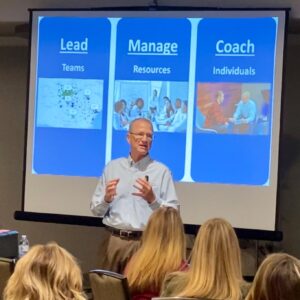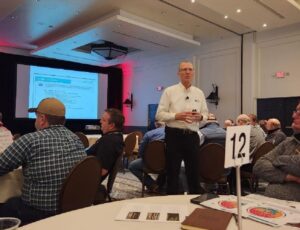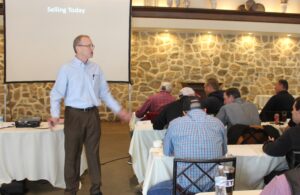And other things you shouldn’t try at home
Last time, we talked about the slinky toy that was handed out in a sales training course. The slinky was symbolic to the continuous process of selling and following up with prospects and customers. If you missed it The Slinky and the Sales Manager.
During this same course, we were also given a bicycle hat. It was one of those old-time soft hats that I imagine they wore 100 years ago when riding a bike. Returning home after three days on the road at my sales training, I walked in wearing my new bicycle hat. Giving one of my kids the hat and one the slinky, they were off to play with their gifts from afar that Dad brought home. My wife laughed as I explained what we covered in our training. Making my opening explanation to her, “See hon, you just have a big back tire”, I immediately knew I had stepped over the line. “Excuse me! What did you just say?” was her reply. Realizing I was in trouble, I started talking fast to explain myself.
See, the bicycle is symbolic of the two components that you bring to the sales process. The front tire is your technical skills. The back tire is your interpersonal skills, often called soft skills. As mentioned last time, I disagree with the term soft skills. Over the course of 25 years, I find these to be the most difficult for salespeople to learn and change, myself included.
I was still explaining quickly as my wife was starting to calm down over my comment about having a big back tire. Examples of front tire skills in ag sales are ration balancing skills for the dairy feed salesman, herbicide selection skills for an agronomist, futures and options strategies for the grain buyer, engineer skills needed to determine the best augers and conveyors to install for the equipment salesperson. You get the point. These skills are critical and your customer is relying on you to bring them to the sales process.
The problem is that most salespeople focus too much on these technical skills (front tire) at the expense of their interpersonal skills (back-tire). This is especially true of new salespeople. It’s understandable, you lack confidence due to a feeling of lacking competence in your industry. So, you focus on learning as much as you can about how to bring the technology of your business to the customer. Armed with the latest technical info from your research and marketing departments, you journey into your territory, ready to inform the world of the great things you have to offer. Let me guess, these things save your customer time and money. However, you struggle to get appointments or understand why a prospect doesn’t see the value in your product. You clearly showed how it saves time and money. Your fungicide will yield two more bushels to the acre but only costs 50 cents/acre. Your enzyme allows for a 10% improvement in average daily gain, which allows the producer to finish hogs in fewer days. “What’s not to love?” as one of my friends always uses for a trial close.
I find that even experienced salespeople focus on front tire skills. They have been around a while and had success at selling. So, they feel like they pretty much have this sales thing figured out. They know how to “judge” a prospect on when to apply sales pressure and when to back off or when to close versus when to continue presenting more information on their products. As their sales manager, we fail to challenge them in this area as well. We may even think, “John has been at this for twenty years, he knows how to sell.” I challenge you to think about a few things. First, maybe John has been doing it wrong for twenty years and nobody has told him. Without a healthy level of self-awareness, John may be unaware that he has poor sales skills. His improvement is slower without a coach riding with him to work on those skills. If you do ride with John, you fall into the trap of only coaching on the technical skills of the sales call. Why? Because they are more comfortable to talk about and less confrontational. As a sales manager, it’s much easier to make the observation, “John, I think you could have used our new spreadsheet when explaining the growth curve of calves on our amino acid balanced program.” John will probably reply, “Yeah, I need to go over that with our research department so I’m more comfortable using it.” While this observation is important for John, helping him realize that he never asked a single question on the sales call can be even more important. As the sales coach, you owe it to John to make this observation, even if you think it’s going to be confrontational, possibly embarrassing for John. However, it can change his entire sales process for the better.
Still not convinced as to the importance of the back tire skills? Still, think they are soft skills that aren’t as important as your technical skills? There is a famous research project conducted by the medical and insurance industry. They were trying to find out what caused a person to pursue a medical malpractice lawsuit. Pretty obvious, right? Medical malpractice causes a medical malpractice lawsuit. Not so. They found the only aspect they could directly correlate to a patient filing a lawsuit was the doctor’s bedside manner. It wasn’t the quality of the actual procedure, the success in solving the patient’s problem nor the amount of pain and suffering endured. It was the back tire, soft skills of how the doctor treated her patient. Did she listen to the patient? Did she seem genuinely interested in helping the patient? Did the patient have ample time with the doctor? These aspects were more important than actually fixing the medical problem.
How do I build a bigger back tire?
- Self-awareness in this area is critical. Get a coach/observer/peer and have them ride with you on sales calls. Ask them to evaluate you on the sales skills as much as your technical skills. Give them this permission before going on the call. That way they feel comfortable giving honest feedback.
- Use assessments. DISC is the first assessment I recommend. It’s great at giving you awareness of yourself and other people. Clifton Strength Finders is an outstanding assessment and feels easier to understand than Myers Briggs. The price range on assessments is anywhere from free to $200 range. Well worth the investment. Yes, I sell them, but they are also available from many places. Just make sure you get the follow-on training on how to interpret and use the results of the assessment.
- Get a library card and use it. How many miles a year do you drive? 25-30,000 maybe. That’s roughly 600 hours in the car, which is about 300 books per year! Music and talk radio are fun, but teach you very little of importance. Your library is full of some of the greatest sales books on CD and they are free. In addition, if you ask nicely, they will order CD’s they don’t have. So, stop by today and check them out.
Epilogue: From that conversation with my wife forward, it became a running joke as we referred to this training as “the bicycle thing”. When leaving for the next phase of training, she would ask if I was going to the bicycle thing.
Further proof that back tire skills are important, I failed to learn my lesson on trying to bring home my work lessons. A few years later, I learned how to weigh tape a horse at a technical training session. This is a manual process of using a tape measure to record the length, height, and girth of a horse to determine how much it weighs. Weight is one component used to determine how much feed it requires. After supper one night, I explained this process to my kids who were six and eight at the time. I brought in the weigh tape and demonstrated on them how it worked. They were amazed at the accuracy and completely unaware that I already knew their weights. Realizing the comedy of the moment, I asked them if I should try it on mom. Yes! was the resounding scream. Turning towards my wife, I think her comment was, “Come near me with that tape and lose an arm!” A little feed sales humor in your day is truly the spice of life.
Webinar
It’s Closing Time!
On average, you fail to ask for the sale 50% of the time!
- Learn how to never forget to close at the end of every sales call you make!
- Learn how to be successful on those Closes!
- Join me Wednesday, Oct 3rd for a deeper dive and insights into Closing Skills!
Learn More – Click on the link below
Make your next meeting memorable by bringing in a speaker who’s been there.
Contact me to find out how Greg@GregMartinelli.net (608) 751-6971
For more Ag Sales Training, Ag Sales Coaching and Leading Ag Sales Teams,
go to http://www.GregMartinelli.net/





